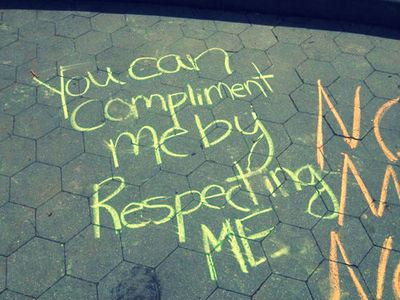Lorna M. Hartman, Spokane, WA, SSH Blog Correspondent

The discussion has begun on the street harassment women experience when they exercise outdoors. Articles here, here and here (one by our own Holly Kearl here at SSH) describe this type of harassment, and plenty more are a Google search away.
Yet the pushback against this aspect of harassment is considerable. Exhibit A is the comment section of any article on street harassment of women exercising in public spaces.
Kearl’s article cited above gets this gem: “v9988, I don’t make cat calls towards woman and I don’t condone it. On a list of problems that a person could have, cat calls should be near the bottom. If common cat calls bother her then she should grow a thicker skin … She should be happy that she has the ability to run and is pretty enough to get a cat call once in a while. I used to run when I was younger and as a straight man I did not enjoy the occasional cat call that I got from men but it was no big deal.”
A couple of comments down, the attitude continues: “Wait til you lose your looks, become middle aged and the male attention stops. Then you’ll really have something to complain about. Lighten up honey. Not every woman considers a wolf whistle dangerous harassment. Geez. Lemme guess, you majored in ‘Wymyn’s Studies’ in college. Men are the enemy!”
Several more comments down there’s this excerpt: “If you choose to just run along the side of the road in spandex or tight shorts, you will receive catcalls. That is just human nature.”
A 2012 article titled “Running With Breasts: Why Won’t Men Leave Me Alone When I’m Jogging?” by Philadelphia writer Erica Palan describes her experiences jogging in public areas. First comment: “Another woman complaining about her boobs! There doesn’t seem to be one woman on this planet who likes her own boobs (or anyone else’s) … ” and it goes downhill for several paragraphs.
Writer Maghen Nicole says, “As a young, female cyclist, my safety and right to access transportation with dignity has been compromised by traffic and pedestrians,” in her article “Harassing Me While I’m Biking Is Still Street Harassment” published in mid-August this year.
She goes on to say, ““Street harassment is yet another way for men to exert their power over women, far too often without question or consequence. Cyclists have had enough. Women have had enough … cases as extreme as passengers in cars reaching out to touch and grab women biking have been reported … women have reported men making uncomfortable and offensive comments about the way they were seated on their bikes.”
Her article was met with responses such as:
* “Should you be harassed no. Is cat calling really so bad that it makes you feel un-safe? If it does make you feel that way you better just stay home with your mommy while she cooks you din-din”
* “So much women’s studies jargon just to complain about someone saying something to you.”
* “Words are words; learn to be an adult and not some sniveling 12 year old … Now it’s ‘Sticks & stones will break my bones; Words will devastate my inner child, because I’m sniveling cry baby!’”
A blogger named Mountaineer created a Twitter handle called @offsideplays where women can share their experiences of being harassed while bicycling.
She wrote, “Since I created Offside Plays (@offsideplays) as a site to expose the everyday discrimination (e.g. racism, sexism, homophobia etc.) that takes place in sport and exercise nothing has caught my attention more than the harassment that women face while biking … I am consistently surprised by the amount and type of harassment/abuse faced by women on their bikes.”
How do we raise the social and legal costs of harassing outdoor exercisers simply for being female in a public space?
* Push back verbally if it’s safe to do so—both men and women can do this.
* Report physical contact by harassers to police, whether it happens to you or whether you observed it happening to someone else. A harasser moving into someone’s physical space and touching them is breaking the law.
* Advocate for police to have training on what street harassment really is and what it’s really like, and expect police to follow it up when you report a physical assault or stalking situation.
* Press charges when we have opportunity to do so, if we can afford it financially and emotionally.
* Share your stories with friends and family. It gives them the choice: They can either voice their support, or lose the ability to be in denial.
Post your stories to public online places like @offsideplays, the Hollaback website and Hollaback iPhone and Droid apps, following Twitter account @EndStHarassment and tweets tagged #endstreetharassment, following and submitting your stories to StopStreetHarassment and Fuck You Street Harassment on Tumblr, and many more.
There’s a lot of work to do before women exercising outdoors are treated with the respect due to any human being. But we are doing the work, and we can achieve the goal with perseverance.
Lorna is raising three young, kindhearted male allies and has worked on rape and interpersonal violence since the 1990s, including serving on the local rape hotline, answering calls, and driving to emergency rooms to advocate for victims and connect them with resources they needed.
